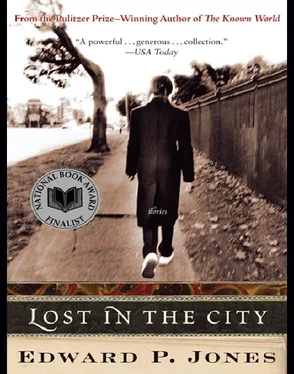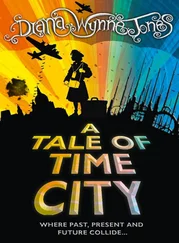The pictures of her mother started in the center of the coffee table display. Her mother rarely smiled in the photographs and she often looked into the camera as if the eye had caught her doing something God would not approve of. “I just don’t take the good pictures,” her mother had said when she saw the display at the apartment Joyce had left behind.
The pictures of Rickey began under the see-through glass more or less where the photographs of Santiago at ten began. Rickey did not like having his picture taken, and so most of the photos were of him in unguarded moments. One was taken at somebody’s house during Christmas. The camera had caught him with his mouth parted in a small O and the camera had given him red eyes. Rickey’s pictures had replaced those of the two men who had fathered her three children. He was the first man in her life who had never beaten her. And for a long time she thought that because he did not beat her, he did not care for her as much and that one morning she would wake up and, like the others, he would be gone.
Before Rickey Madison became a driver and bodyguard for Santiago Moses, he worked construction. The work was steady enough so that at least once a week he could take Joyce and her children to the Flagship on the wharf. One evening two years or so before, they came out of the restaurant and found that Rickey’s Chevy wouldn’t start. Rickey, after spending more than half an hour under the hood, stepped away from the car with resignation and spat into the gutter. Joyce watched him. He was the kind of man who had nightmares about not getting to work on time. Santiago, laughing, made the sign of the cross over the car.
“What the hell you laughin at, boy?” Rickey said. Clovis, Joyce’s little girl, came up to him and put her hand in his.
“You,” Santiago said. “You look like you don’t know whether to shoot that thing or beg it for another chance.” He put his arm around Rickey’s shoulder, for by then Santiago was a head taller than the man.
“You think this so damn funny, huh?” Rickey said. “If I can’t get to work in the mornin, you may not eat next week.” Joyce worked as a home care aide, but it was Rickey’s money that kept the family going.
“Oh, I’ll eat all right,” Santiago said. He took several new bills from his pocket. “Next week, and the week after that, and the one after that, and all the ones after that too.” He stuck some of the money in Rickey’s pocket. “Take a cab to work tomorrow.”
“It probably some play money,” Clovis said.
“Play money my ass,” Santiago said. He had not come to the restaurant that evening with the rest of the family. And when he did arrive, he was accompanied by a woman who must have been at least ten years older than he. The woman had brought along her son, about three or four years old. “Play money my ass,” the woman said.
Rickey counted the money, then he counted it twice more, spread it fanlike and turned to show it to Joyce. “Look,” he said to her. “Look at this.” He said to Santiago, “You hit the number or somethin, boy?”
“God provides,” Santiago said. “God is good.” He said to the woman, “Ain’t that right, baby?” She sidled up to Santiago and began to giggle. The woman wore a low-cut blue dress and a gold crucifix on a gold chain around her neck, and all through dinner Joyce had looked at the cross resting between the woman’s breasts. “God is everything,” Santiago said. “God is good.”
The moment Joyce had seen the woman walk into the restaurant, she knew she would not like her, knew the woman had been doing things with her son. Santiago continued on about God and goodness, and the woman leaned herself and her breasts against him. “Now why don’t you go find a cab so you can take the family home,” Santiago told Rickey. Rickey, without words, went off to look for a cab. “Me and Tamara gon take her car.” The woman’s little boy, looking at Rickey walk away, sat down on the sidewalk with a very loud sigh, as if he thought there would be much more talking and he may as well wait until it was all over.
In the cab, Joyce, seeing how happy Rickey was, told the cab driver to take the long way back to their apartment.
The next time Joyce saw the boy and his mother, it was the day after they had delivered the pool table for the basement in the new house. The woman had reached through the iron-bar door and knocked at the wooden door, and she was about to knock again when Joyce opened the door.
“You tell Sandy he can have him,” the woman said to Joyce. She took one of the boy’s hands and wrapped his fingers around one of the bars. “This is my settlement for all the money I owe him.” In his other hand, the boy was holding a little car, and leaning against his leg was a small suitcase held together with rope. “You tell him he can stop buggin me now bout what I owe him. Mark me down paid in full. And tell him to send me a receipt care of General Delivery.” She went clackety-clack down the stairs in her high heels, wobbling the way Joyce had seen Humphrey wobble, and the boy began to cry. “Shut up, gotdamnit! Shut up, I said!” She was down the street before Joyce could collect herself to say anything.
“Hey! Hey! Wait a minute! Whas goin on here!” Joyce opened the iron-bar door, nearly knocking the boy down the steps. “Come back here!” The woman was nearing O Street. “Sweet Jesus,” Joyce said to herself. Had she not been in her bathrobe she would have run after the woman. “What are you doin?”
The boy was still crying. “Well, I don’t love you neither!” he yelled to his mother as she turned the corner, and then he threw the car in her direction. “And I never even did.”
When Santiago called that afternoon, he told his mother it would be all right, that the boy would be gone by the evening. “The dopey bitch just made a mistake, thas all,” he said. But the boy, Adam, stayed three weeks, and no one ever again saw his mother. He was a silent presence in the house and never caused Joyce a moment’s problem. Whatever Joyce told him to do, he did without question or sass. He had retrieved the car the first day, and for all those three weeks, he mostly sat out of the way in a corner of the living room, rolling the car back and forth. The carpet was too thick for the car to move very far on its own, and the boy usually pushed it all the way. Unlike other boys she had known, he did not make car sounds as he moved it. By the time the city government woman had come to get him, Joyce had given him a piece of her heart. The city government woman, who quickly produced a large red sucker as if she expected trouble from Adam, spoke college-people English and double-parked in front of the house. The city government woman took him by the hand, and the boy did not say good-bye and he did not cry. Quite often after that, after Santiago had released Rickey for the night and Joyce had curled up beside him in their bed, she would see Adam in her dreams. But in the dreams he was always a grown man and he would somehow come through the iron bars of one of the basement windows in the dead of night, and when, in the dark, they came upon each other, in the kitchen, on the stairs, in one of the children’s rooms, she did not understand why she was not afraid of him.
“I guess he must get that kinda need from you, cause he done gone and bought a house in Fort Washington,” Rickey said to Joyce one evening, nearly a year after they had moved into the house. They were in their second-floor bedroom, in their pajamas on the bed, the way Joyce liked to relax with Rickey after her two youngest children were asleep in their beds on the third floor. For a change, Santiago had let him go early. Rickey was leaning back against the headboard and Joyce was lying across the foot of the bed, and in front of her were a beer and her cigarettes and an ashtray on a bamboo tray that could not be tipped over. “I guess he’ll be invitin you and the kids out to see it soon.” This was how she received most of the news about Santiago, in bits and chunks from Rickey when the day was all but over.
Читать дальше












